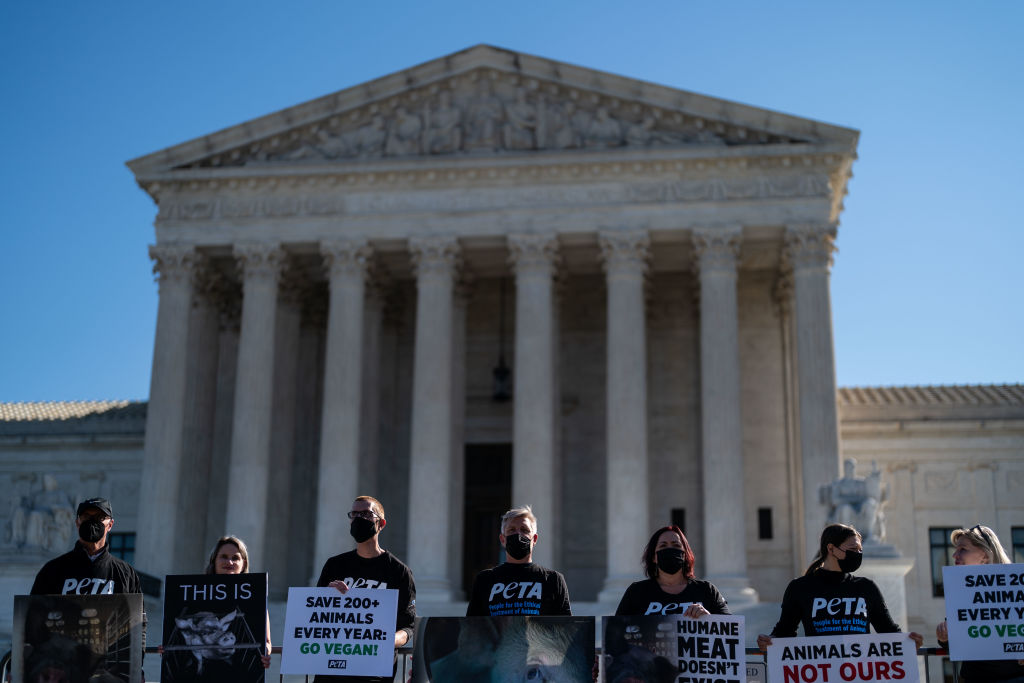The U.S. Supreme Court heard a case this week that could have huge implications for all sorts of state climate regulations, from clean electricity mandates to vehicle fuel standards. But the arguments in court on Tuesday didn’t actually center on the environment. They were about pigs.
At issue is a California law passed in 2018 requiring all pork sold in the state come from facilities where sows have at least enough space to stand up and turn around. This was then challenged by the pork industry, which argues that California’s regulation effectively mandates the practices of hog farmers in a state like Iowa, since now they have to change their practices in order to sell pork in California. At the heart of this argument is a piece of case law known as the dormant commerce clause. And how the Supreme Court decides to interpret it could have rippling climate consequences.
A version of this story first appeared in the Climate is Everything newsletter. To sign up, click here.
The dormant commerce clause is like a shadow corollary to the commerce clause in the U.S. constitution, which states that the federal government has the right to regulate interstate commerce. Courts have decided that—because the feds regulate interstate commerce—states shouldn’t do it themselves.
But almost anything a state does is likely to have some impact on commerce in other states (if New York lowers its tax on gasoline, it might cause fewer people to buy gasoline in New Jersey, for instance) so there’re some important (though somewhat complicated) limitations to how courts have applied the dormant commerce clause to disputes over state law. In this case, the pork industry is asking the court to apply the dormant commerce clause to a broader set of scenarios.
Over the years, dormant commerce clause arguments have been used as a tool by those trying to roll back state environmental regulations, like green energy mandates that might make an energy company in another state switch from fossil fuels to renewables. Most of those challenges have failed, though there’s currently one case being heard in federal court in the Northeast, PJM Power Providers Group v. FERC, challenging state clean energy mandates along similar argumentative lines.
Depending on how the Supreme Court decides the pork case, it could affect the PJM case, and make other state climate laws much more vulnerable to similar lawsuits, undermining states’ ability to implement climate policy. Lawyers for pork producers argued yesterday that existing environmental statutes, such as California’s vehicle emissions mandates, would not be impacted by this particular case, due to previously established federal legislation. Some justices seemed unconvinced; the conservative Justice Amy Coney Barret, for example, pressed the petitioners in National Pork Producers Council v. Ross. “What if they didn’t?” she asked, referring to state laws that didn’t have similar special federal law status. “Would this have far-reaching consequences?”
Read more: What the Supreme Court’s Ruling on the ‘Clean Air Act’ Means for Carbon Emissions
It’s hard to predict what the court will decide when it hands down its decision next summer. Views of the dormant commerce clause don’t fall along typical ideological lines. The Biden administration, for instance, released an amicus brief arguing against California’s animal cruelty law, but in such a way that would likely not threaten environmental regulations in other states. On the other hand, Justice Clarence Thomas, widely considered the lodestar of the court’s ideological Right, could decide in favor of California. (The dormant commerce clause appears nowhere in the constitution, which, according to Thomas’s “textualist” judicial viewpoint, means it should not exist.)
And judging by the general tenor of questions on Tuesday, the court doesn’t seem inclined to rule in favor of the pork producers, and thus likely won’t open state environmental laws to more legal challenges. “I would be surprised,” says Ari Peskoe, director of the Electricity Law Initiative at Harvard Law School. “But this Supreme Court has done surprising things recently.”
- Tarana Burke: What 'Me Too' Made Possible
- Column: Youth Incarceration Harms America's Children. It's Time to End It
- What TIME's Newest Class of Next Generation Leaders Can Teach Us
- 14 Actually Good Books To Teach Kids About Climate Change
- Column: The Fate of the Amazon Rainforest Depends on the Brazil Election
- Lessons From a Half-Century of Reporting on Race in America
- What Happens If I Get COVID-19 and the Flu at the Same Time?
- A Year After Striketober, Employers and Labor Unions Aren't Getting Along


